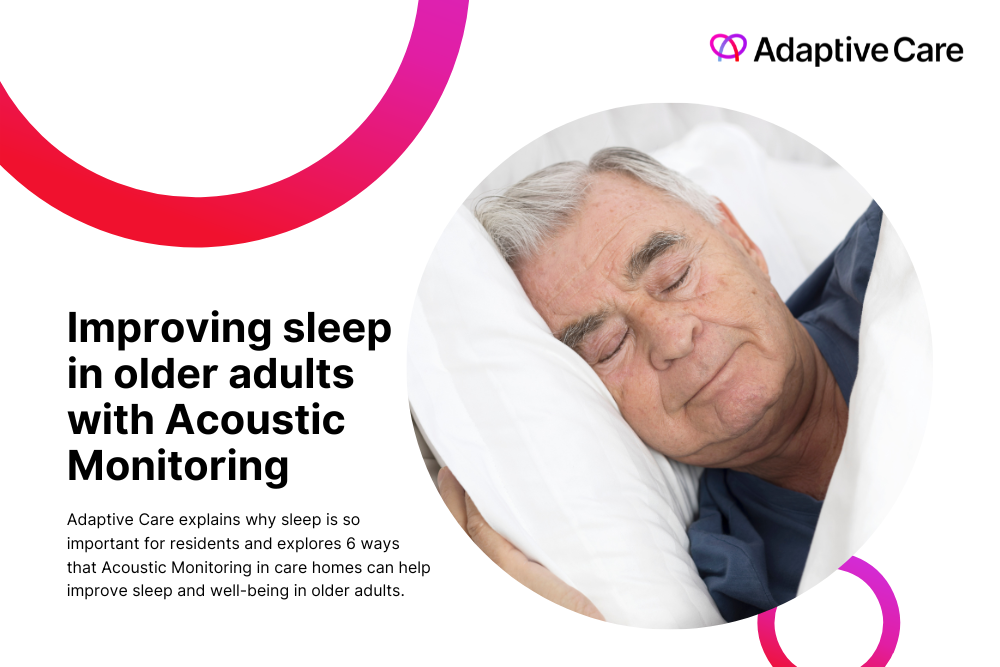
Improving sleep in older adults with acoustic monitoring

07 June 2024
Acoustic monitoring (AM) can help improve the sleep quality within care environments. We explain why sleep is so important for residents and explore 6 ways that acoustic monitoring in care homes can help improve sleep in older adults.

Why is sleep so important for older adults?
Physical health- getting enough sleep is essential for maintaining physical health, including tissue repair and cell regeneration. A lack of sleep can weaken the immune system, making residents more susceptible to illnesses and infections.
Cognitive function– Age UK recommends to aim for 7-8 hours of sleep, as sleep is important for brain health. Less sleep than this can cause memory issues and declined overall cognitive function. Prevent memory issues plays a huge part in preventing overall cognitive and physical decline, particularly for those living with dementia.
Emotional wellbeing– a lack of sleep can increase the risk of depression, anxiety and irritability. For older adults in care facilities, maintaining emotional wellbeing is essential for overall quality of life.
Safety– inadequate sleep can impair judgement, coordination and reaction times. This increases the risk of accidents and falls, and this is exacerbated by the fact that many residents in care facilities may have mobility issues or other health concerns.
Management of chronic conditions– many elderly residents in care homes have chronic health conditions, such as diabetes, heart disease or respiratory disorders. Getting enough sleep will help manage these conditions by regulating blood sugar levels, reducing inflammation and supporting cardiovascular health.
Quality of life– getting sufficient sleep means that older adults will be able to engage more fully in both physical and mental activities and keep up social interactions with staff, family and other residents. Without sufficient sleep and rest, with traditional routine in room checks throughout the night, it can mean people are less rested and thus less interested in engaging in social activities during the day
6 ways acoustic monitoring in care homes can help improve sleep in older adults:
1. Early detection of disturbances
AM systems pick up sounds of physical activity or emotional distress. Care providers will receive an alert and can intervene upon these signs of discomfort and prevent falls and possible hospital admissions.
2. Reduced staff intrusion
Acoustic monitoring reduces the need for frequent physical checks which disrupt sleeping patterns. Remote checks using AM technology reduces the need for disturbances to sleep and gives older adults a better quality of sleep.
3. Personalised care
Highly personalised care is another benefit of acoustic monitoring that means older adults can experience better sleep. By analysing patterns of sound and movement, the AM system can provide insights into the individual’s sleep cycles and behaviours, leading to more personalised care interventions. Better sleep also allows caregivers to understand residents’ behaviours better.
An example of this is when a care home client of Adaptive Care, implemented a novel approach to address sleep disturbances among its residents and with residents that didn’t sleep well. Traditionally, door knocking checks were conducted to ensure residents were asleep, but this often disrupted their rest. Instead, the care home established a group of residents, where they could engage in stimulating activities until they felt tired, before being gently guided to bed. This innovative initiative, made possible by Acoustic Monitoring, allowed staff to monitor each room discreetly. As a result, the number of residents staying awake significantly decreased from 16 to just 3, demonstrating the effectiveness of this approach in promoting better sleep hygiene and overall well-being.
4. Improved safety
According to the NHS, around 1 in 3 adults over 65 and half of people over 80 will have at least one fall a year. Night falls or medical issues during the night can be monitored using AM equipment. Staff are alerted to potential emergencies and can intervene quickly to prevent accidents or mitigate health risks. A recent example of this is where an Evesham based Care Home experienced a significant 71.4% decrease in falls since using Adaptive Care’s Acoustic Monitoring.
5. Enhanced peace of mind
For both residents and their families, knowing that there is a non-intrusive acoustic monitoring system in place can provide peace of mind. Security and comfort are promoted, without compromising resident care or safety.
6. Optimised staff efficiencies
Since acoustic monitoring helps identify residents who require urgent assistance, staff can prioritise their interventions and use resources more efficiently – resources will be directed to where they’re needed most.






